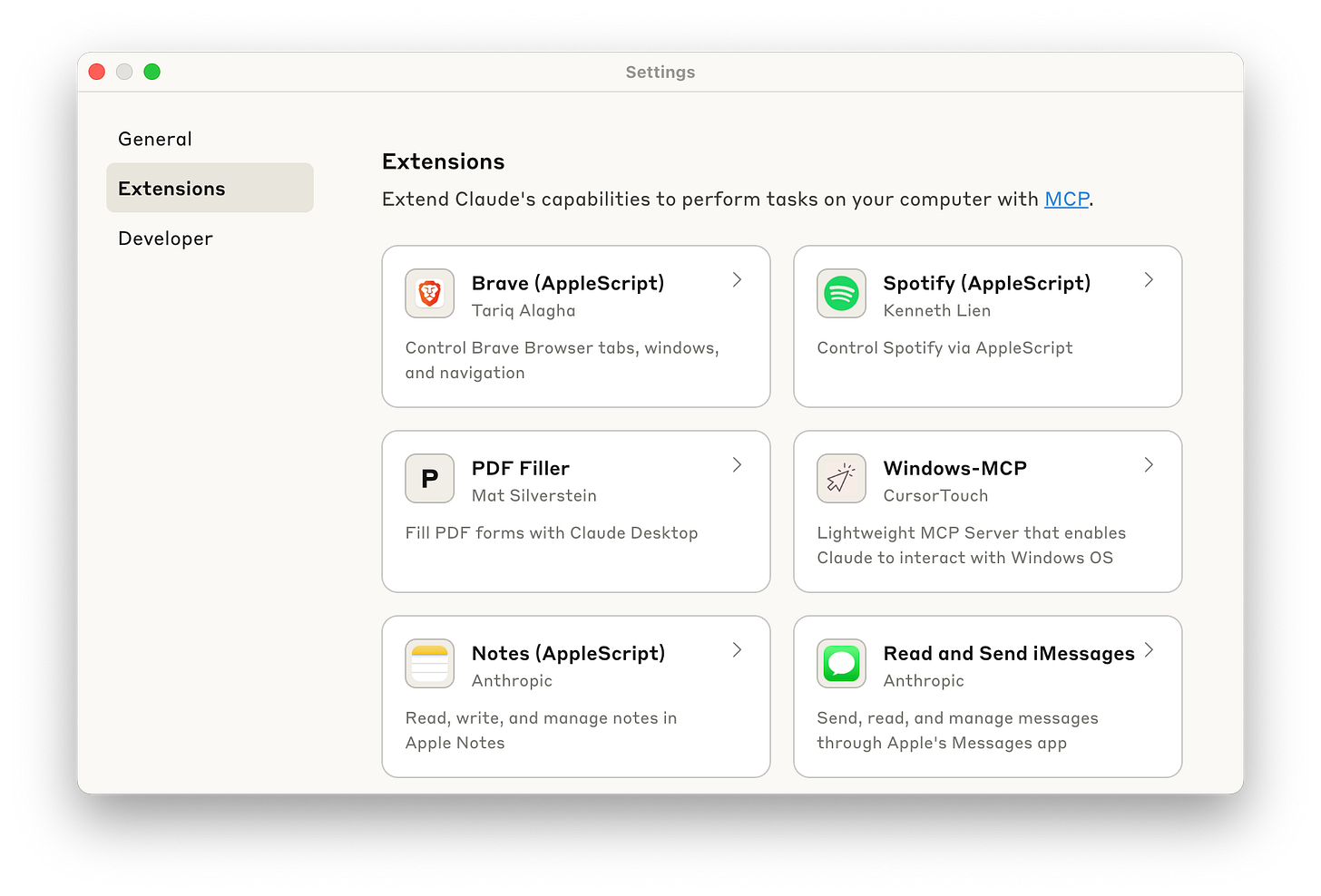Welcome to DXT Weekly
July 15, 2025
Welcome to DXT Weekly, a guide to one of the most interesting developments in the AI application layer since ChatGPT launched. You've joined our community of early explorers who want to stay ahead of what's next, and participate, in AI productivity.
If you're wondering what "DXT" even means, you're not alone. Desktop Extensions were only just announced by Anthropic in late June 2025. You might see these called 'MCP servers,' 'integrations,' or 'custom connectors' elsewhere. We call them Desktop Extensions because it captures what they actually do: extend your AI's capabilities just like browser extensions extend your browser. And, hey, because that’s what Anthropic calls them!
What Are Desktop Extensions?
Remember when browser extensions transformed how we use the web? Extensions like password managers, ad blockers, and productivity tools turned basic browsers into personalized workspaces. Desktop Extensions do the same thing for AI applications.
While it was technically possible to add these capabilities before DXTs (through MCP servers), it required developer knowledge: editing JSON configuration files, installing dependencies, and troubleshooting conflicts.
Now? You download a .dxt file and double-click it. That's it.
What DXTs Enable
The early DXT ecosystem is already showing lots of creativity. Developers are building extensions that let Claude:
Access your computer’s built-in apps – Search your contacts, create calendar events, send messages, and organize notes without leaving your AI conversation
Manage your development infrastructure – Deploy applications, check server status, and troubleshoot issues through natural language commands
Bridge your existing tools – Connect with Airtable databases, Obsidian vaults, LinkedIn profiles, and dozens of other applications you already use
These aren't theoretical possibilities—they're working extensions you can install today.
Here's a quick example of what this looks like in practice: Instead of switching between Claude, your calendar app, and your email to schedule a meeting, you could ask Claude to "check my calendar for Tuesday afternoon, find John's email address from my contacts, and send him three time options." With the right extensions installed, Claude can do all of that in one conversation.
So What?
We're witnessing the emergence of a new software category. Just as smartphone apps created entirely new industries and opportunities, Desktop Extensions are creating new possibilities for how we interface with the digital world.
It’s becoming clear that the most useful applications won’t be limited to standalone products—they'll be seamless integrations of AI capabilities with useful tools, and the data you own or have access to.
Desktop Extensions make that integration accessible to everyone.
And, creating Desktop Extensions is not terribly difficult. With lower barriers to entry, we expect this ecosystem to grow rapidly on its way to becoming very large, fueling creative and economic opportunity along the way.
What DXT Weekly Will Cover
DXT Weekly will be a curated guide to this rapidly expanding ecosystem. Each issue will feature:
Several handpicked extensions that demonstrate new possibilities for AI-powered productivity. We'll focus on practical applications that solve real problems, not just technical curiosities.
Clear explanations of what each extension does, who should use it, and why it matters. No developer jargon—just practical insights about how these tools can improve your workflow.
Ecosystem insights tracking trends, popular categories, and emerging use cases as the DXT community grows.
Early access to discovering extensions before they become widely known. We're building intelligent discovery systems to surface the most promising new releases.
Our mission is simple: help you discover the extensions that will transform how you work with AI, explained in terms that make sense whether you're a developer or someone who just wants to get more done. And have a little fun along the way while making whatever positive contribution we can to the community.
What's Next
The Desktop Extension ecosystem is growing rapidly. We're already tracking many dozens of extensions, from productivity tools and development utilities to creative applications and research assistants. New extensions are being released weekly, and the possibilities are expanding faster than any individual can track.
That's where DXT Weekly comes in. We'll do the discovery, testing, and curation so you can focus on the extensions that matter for your specific needs and interests.
Ready to roll? The future of digital productivity is being built one extension at a time. We want to help you (and us!) discover it.
Getting Started
Download Claude Desktop if you haven't already: Claude Desktop Downloads
Look for the Extensions section in Settings to start exploring
Extensions are currently available for macOS and Windows
What's Coming
Issue #1 featuring new and popular extensions
Deep dives into the most transformative use cases
Insights from extension developers about what they're building
DXT Weekly is an independent newsletter tracking the Desktop Extension ecosystem. Not affiliated with Anthropic or Claude.
Have an extension to suggest? Reply to this email—we read every message.
Want to build your own? Check out the developer documentation on Github.


